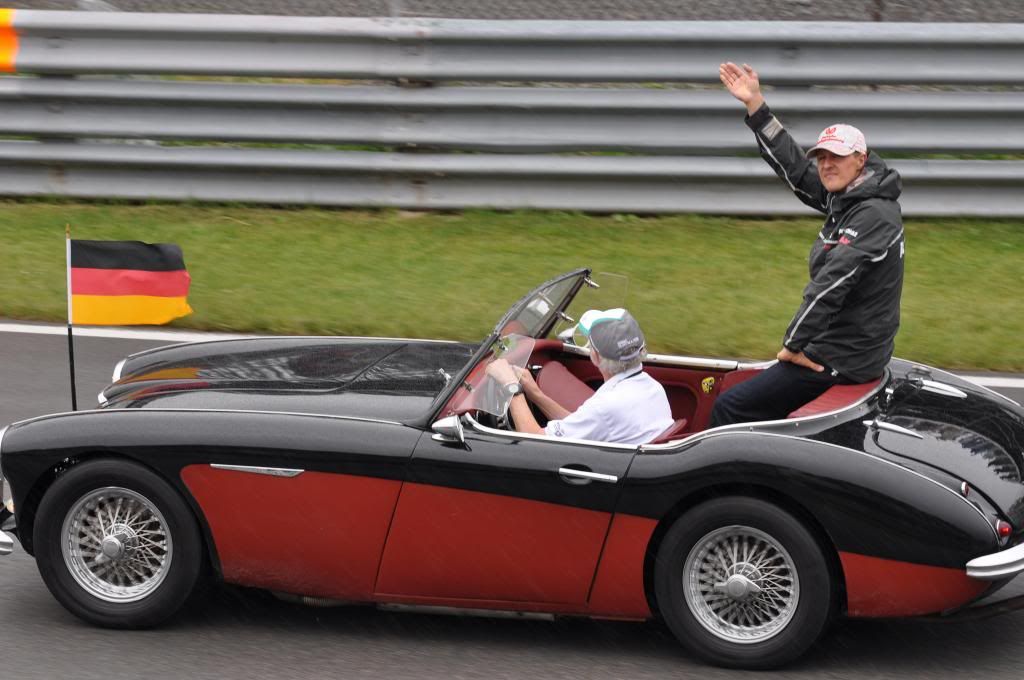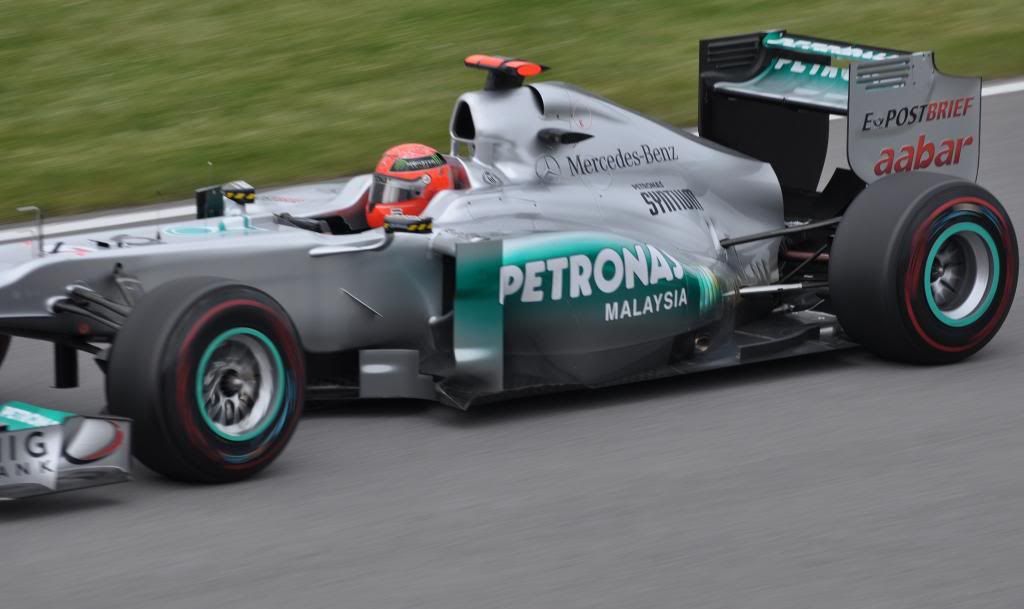- 27 Apr 14, 13:44#400409 After the agony of defeat, success will be sweet!
After the agony of defeat, success will be sweet!
wrote:">Michael Schumacher Coverage Shows Best and Worst Sides of Social Media
For something stereotypically used by those with more keyboard buttons than sense, social media has played quite an instrumental role since Michael Schumacher suffered a skiing accident last December.
In the four months since the seven-time world champion was admitted to hospital in Grenoble, France, the Formula One corner of Twitter has resembled a Schumi shrine.
All, from his colleagues and his rivals to his many millions of followers and fans, have used the platform to express just what Michael Schumacher means to them. Best wishes have littered cyberspace, while his supporters have recalled memories of the finest moments of the German’s 21-year F1 career, painting the picture of an enduring icon.
The high esteem in which Schumacher is held has led to campaigns such as #Red4Schumi, an initiative that encouraged the Twitterati to wear red items of clothing—in tribute to the colour scheme of Schumacher’s helmet—on the day of his 45th birthday in January, which fell only five days after the accident that left him in an induced coma.
On the very same day, Ferrari, the team with which Schumacher claimed five consecutive world championships between 2000 and 2004, encouraged the German’s pilgrims to hold a silent vigil outside the hospital.
Having quickly spread through word of retweet, the scene at Grenoble on 3 January was more reminiscent of that on race day morning at the Autodromo Internazionale Enzo e Dino Ferrari in Imola or the Autodromo Nazionale Monza than a French hospital.
Social media’s ability to bring people together extended into the new F1 season itself, with Mercedes planting a #KeepFightingMichael message on the headrests, which tend to be a favourable spot for sponsors, of both their W05 cars.
That Nico Rosberg and Lewis Hamilton won each of the first four grands prix of the season between them in dominant fashion, for a team for which Schumacher provided a baseline between 2010 and 2012, was fitting.
Furthermore, it provided the most instructive lesson of this troubled time: Even when he appears beaten, fighting the most difficult battle of his life, Michael Schumacher is still a winner.
The widespread desperation to see Schumacher return to a state of health, however complete, has regrettably led to the emergence of false reports in the last few months.
The most recent of which appeared this week, with First Post reporting how a number of tweeters had become carried away with the “news” that Schumacher had finally woken from his coma and recognised Corinna, his wife of 19 years.
The uproar surrounding this development, though, was soon dampened when Bild’s Nicola Pohl revealed that she had been in contact with Sabine Kehm, Schumacher’s manager, who was forced into dismissing yet another round of lies.
For something stereotypically used by those with more keyboard buttons than sense, social media has played quite an instrumental role since Michael Schumacher suffered a skiing accident last December.
In the four months since the seven-time world champion was admitted to hospital in Grenoble, France, the Formula One corner of Twitter has resembled a Schumi shrine.
All, from his colleagues and his rivals to his many millions of followers and fans, have used the platform to express just what Michael Schumacher means to them. Best wishes have littered cyberspace, while his supporters have recalled memories of the finest moments of the German’s 21-year F1 career, painting the picture of an enduring icon.
The high esteem in which Schumacher is held has led to campaigns such as #Red4Schumi, an initiative that encouraged the Twitterati to wear red items of clothing—in tribute to the colour scheme of Schumacher’s helmet—on the day of his 45th birthday in January, which fell only five days after the accident that left him in an induced coma.
On the very same day, Ferrari, the team with which Schumacher claimed five consecutive world championships between 2000 and 2004, encouraged the German’s pilgrims to hold a silent vigil outside the hospital.
Having quickly spread through word of retweet, the scene at Grenoble on 3 January was more reminiscent of that on race day morning at the Autodromo Internazionale Enzo e Dino Ferrari in Imola or the Autodromo Nazionale Monza than a French hospital.
Social media’s ability to bring people together extended into the new F1 season itself, with Mercedes planting a #KeepFightingMichael message on the headrests, which tend to be a favourable spot for sponsors, of both their W05 cars.
That Nico Rosberg and Lewis Hamilton won each of the first four grands prix of the season between them in dominant fashion, for a team for which Schumacher provided a baseline between 2010 and 2012, was fitting.
Furthermore, it provided the most instructive lesson of this troubled time: Even when he appears beaten, fighting the most difficult battle of his life, Michael Schumacher is still a winner.
The widespread desperation to see Schumacher return to a state of health, however complete, has regrettably led to the emergence of false reports in the last few months.
The most recent of which appeared this week, with First Post reporting how a number of tweeters had become carried away with the “news” that Schumacher had finally woken from his coma and recognised Corinna, his wife of 19 years.
The uproar surrounding this development, though, was soon dampened when Bild’s Nicola Pohl revealed that she had been in contact with Sabine Kehm, Schumacher’s manager, who was forced into dismissing yet another round of lies.
 After the agony of defeat, success will be sweet!
After the agony of defeat, success will be sweet!








